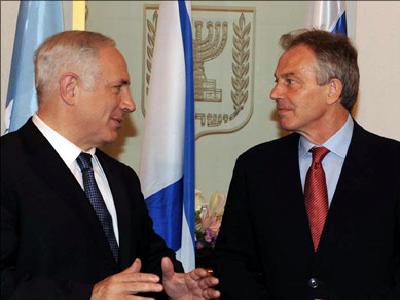
This week, Egypt signed a landmark $12bn deal with British Petroleum (BP) to develop the country’s offshore natural gas resources. The West Nile Delta project aims to bring the gas onshore for domestic consumption within two years, with a view to help solve the country’s ongoing energy crisis.
But the BP deal, which also includes another British firm, BG Group, and RWE Dea owned by a Russian billionaire, is only one of many currently in play across the region involving Israel. Former British Prime Minister Tony Blair, currently Middle East envoy on behalf of the Quartet (US, UK, EU, Russia), is deeply involved.
Official sources throw light on the role Palestinian gas resources play in an internationally backed scheme to facilitate Israeli exports to neighbouring Arab regimes. They confirm that the latest Egyptian deal is part of a wider strategy to use Gaza’s gas to mollify Arab public opinion and consolidate Arab energy dependence on Israel.
Since army chief General Abdel Fattah al-Sisi took power in November 2013, about $2.9bn of foreign investment has gone into Egypt for energy production and exploration. Earlier this year, energy ministry officials confirmed that three new oil and gas deals worth billions of dollars were being negotiated.
But missing from media coverage of Egypt’s deal with BP is its centrality to a wider architecture of import and export deals, with Israel at their centre.
On 8 November 2014, the heads of state of Egypt, Greece and Cyprus were in Cairo for talks on fighting terrorism, and exploiting eastern Mediterranean oil and gas reserves. The meeting resulted in the three leaders signing an agreement on regional cooperation, particularly in terms of bringing the region’s energy resources to European markets.
Sources present at the meeting confirmed that it was a precursor to future tripartite discussions involving Israel, and that the goal was to sideline Turkish efforts to access deposits claimed by Cyprus.
But the new deal just announced is not solely about developing Egypt’s domestic gas reserves. It is also about Egypt importing from “third parties”.
“BG Egypt is working closely with the government of Egypt and our partners to enable the increase of third party gas supply into the country, a reflection of our appreciation of the country’s need for energy,” said a BG Group spokesperson. “These agreements will enable the development and delivery of additional gas volumes to Egypt’s domestic gas market, through the utilisation of BG Egypt’s and our upstream partners’ onshore and offshore infrastructure.”
That third party is Israel. In June last year, BG Group signed a non-binding letter of intent with Noble Energy and Delek to send 7 billion cubic metres of gas from Israel’s Leviathan field to BG plants in northern Egypt over a period of 15 years.
Shortly prior to doing so, according to a senior source in the Egyptian government, a delegation of Israeli government officials had visited Cairo in early 2014 to confirm the gas export proposition with their Egyptian counterparts.
Around the same time BG signed its letter of intent with the Israeli energy consortium, Israel launched its military incursion into Gaza, Operation Protective Edge. Even as Israel resumed air strikes against Hamas after the predictable failure of an Egyptian-brokered “ceasefire”, Israeli and Egyptian officials were in secret talks over the sale of $60 billion worth of Israeli gas to Egypt.
– Read more: How Blair’s Egyptian Gas Gambit Advances Israeli Energy Empire – Nafeez Ahmed, Middle East Eye




